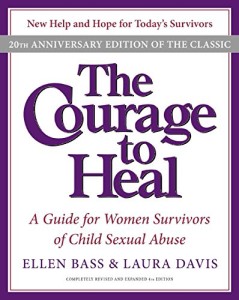From The Courage To Heal by Ellen Bass & Laura Davis
 When children are raised in a healthy environment, their emotions are respected. When they are sad, angry, or afraid, their parents or caretakers acknowledge their feelings, make room for safe expression, and offer comfort. Children raised in an emotionally supportive home are not talked out of their feelings or punished for them. Because of this, they learn that feelings are not dangerous. And their capacity to tolerate difficult feelings increases naturally as they grow up.
When children are raised in a healthy environment, their emotions are respected. When they are sad, angry, or afraid, their parents or caretakers acknowledge their feelings, make room for safe expression, and offer comfort. Children raised in an emotionally supportive home are not talked out of their feelings or punished for them. Because of this, they learn that feelings are not dangerous. And their capacity to tolerate difficult feelings increases naturally as they grow up.
Abused children rarely have this kind of support. They cannot afford to feel the full extent of their terror, pain, shame, or rage; the agony would be devastating. They would not be able to do arithmetic with other second graders, for example, if they acknowledged the depth of their sorrow and desolation.
Because their innocent love and trust are betrayed, abused children learn that they cannot rely on their feelings. And the feelings they do express may be disregarded or mocked.
If the adults around them are out of control, they get the message that feelings lead to violence. Anger means beatings or furniture hurled across the room.
Abused children often learn to block out their pain, because it is too devastating or because they do not want to give the abuser the satisfaction of seeing them cry. But since it’s not possible to block emotions selectively, they may simply stop feeling.
On the other hand, they may feel overwhelmed with feelings, flooded with fear, grief, shame, and rage. All too often, they suffer with this distress alone, without a safe way to express their emotions and without consolation.
Often survivors find it difficult to:
- Recognize their feelings
- Differentiate between emotions
- Express feelings
- Calm down when they get upset
Many survivors feel:
- Disconnected, isolated, and alone
- A pervasive sense of shame
- Just a few feelings, rather than a full range of emotions
- Out of control with their rage or other feelings
- Confused
- Dead inside
Many survivors:
- Are prone to depression or despair
- Struggle with anxiety or have panic attacks
- Alternate between overwhelming anxiety, fear, or rage and being numb and shut down
- Feel agitated and on alert
- Have frequent nightmares
- Are afraid of their emotions
- Worry about going crazy
- Rarely feel pleasure, relaxation, or joy
